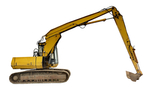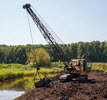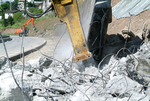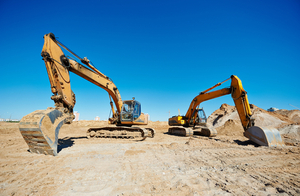- Digging depth. Dig depth is often one of the primary concerns depending on the application. Smaller models are capable of dig depths of only six feet while the largest excavators can dig a trench up to 42 feet from a stationary surface position. Mid-range models typically offer a dig depth of 18 to 19 feet.
- Operating weight. Take note of your estimated max load when evaluating operating weight. This represents the total amount of weight the rig can safely support at the end of the boom (fully-extended) when balancing against the counterweight.
- Emission rating. All non-road diesel engines must comply with the Environmental Protection Agency's Tier 4 hydrocarbon (HC) restrictions for models manufactured from 2015 on. Earlier models are subject to the guides established in Tier 1 through Tier 3 depending on date of manufacture.
- Engine type. Excavators operate on a diesel engine. Newer machines will have clean diesel technology built into the engine. Greatly reducing the excavator's carbon footprint, this advancement uses clean diesel, a fuel that contains 97% less sulfur than traditional diesel fuel.
- Pricing. Excavator prices start between $100,000 and $200,000 and can go as high as $1,000,000 or more. A good used excavator is typically 2 to 3 years old, has less than 1,000 hours of use and is often 25% less than its new counterpart. With the quick advancement in technology, just make sure you're getting all the features you need. It's worth noting that leases and excavator rentals are extremely popular within this category, providing the latest advancements without the high cost of purchase.
Model comparisons
When comparing excavators, you'll find a variety of types including compact excavators and crawler excavators. But among construction and industrial applications, excavators tend toward specialized functionalities. This is particularly true when it comes to the maneuverability they provide and their approach to materials handling.
Long Reach Excavators
Another method of reaching into a construction area from the stability of solid ground, long reach excavators are equipped with an extendable arm that reaches in from 40 to 100 feet. Also known as "long reach fronts" and "super long fronts," a low center of gravity and heavy counterweight enables them to span fragile terrain, rivers and similar waterways, as well as reach into the depths of a foundation.



 As you narrow down your list of excavators, another dependable method of choosing the best one is by comparing dealers. Known for incorporating proprietary technology and features into the equipment as well as offering a host of post-sale support plans, excavator manufacturers are often the key component to a solid ROI.
As you narrow down your list of excavators, another dependable method of choosing the best one is by comparing dealers. Known for incorporating proprietary technology and features into the equipment as well as offering a host of post-sale support plans, excavator manufacturers are often the key component to a solid ROI.